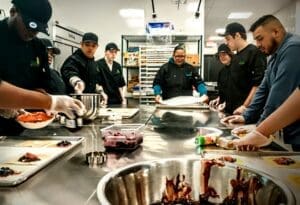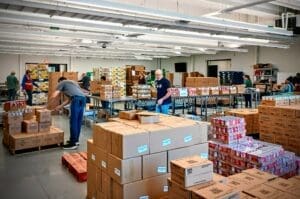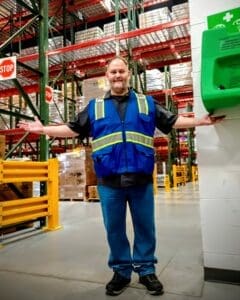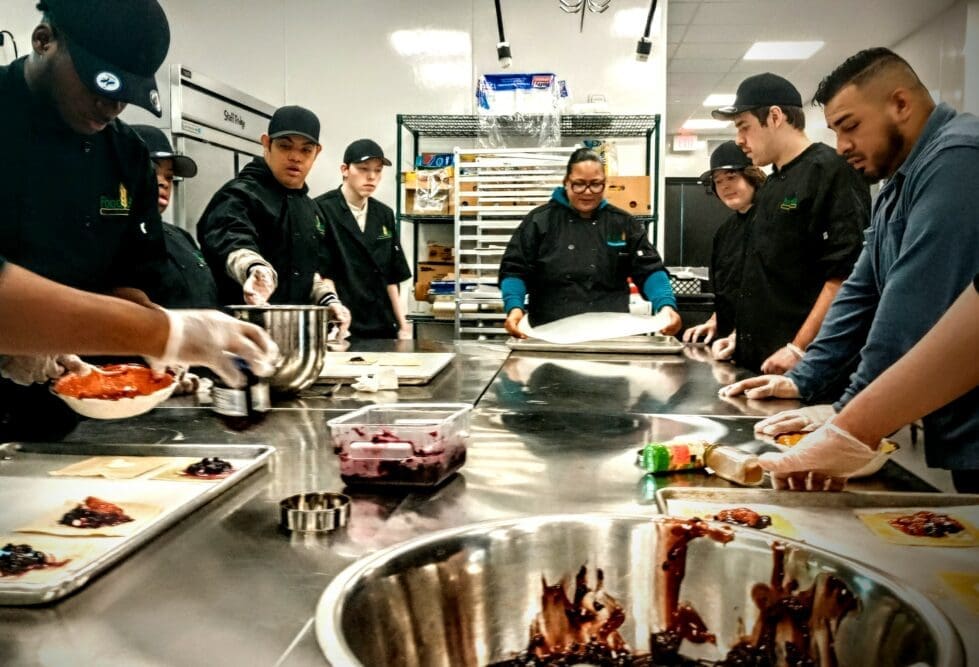

The Food Bank of Delaware’s job training programs offer culinary, warehousing and logistics classes. Photo by Katie Kazimir.
“Food for today, food for tomorrow” doesn’t just refer to leftovers at the Food Bank of Delaware’s Milford Branch.
The motto encapsulates the nonprofit’s mission to provide Delawareans nourishing food as well as long-term solutions to poverty and hunger.
“Food for today” meets the immediate needs of people by various efforts to distribute food, including home delivery, mobile food pantries and the Healthy Pantry Center.
“People are not stuck receiving food bank services forever. We’re not a vacuum,” said Chad Robinson, vice president of external affairs.
That’s where “food for tomorrow” comes in. It’s designed to help clients become self-sufficient through nutrition education, financial guidance and workforce training programs.
Healthy foods are often expensive, and research by the Food Bank of Delaware has found low-income populations will stretch funds for foods with items of little to no nutritional value.
Poor diets often contribute to or lead to chronic illness such as diabetes, high blood pressure and heart disease.
Food Bank education
To help, the Food Bank’s nutrition education program such as Create Better Health and Food Smarts, teach low-income adults – particularly those on government benefit programs – how to minimize waste while preparing healthy food.
“The nutrition education courses also teach clients how to take ingredients they have and stretch them further,” Robinson said
A financial coaching program, Stand By Me, offers one-on-one support for people who want to understand money better. It also offers assistance applying for state benefits.
Financial health is the goal, with clients gaining autonomy and independence as they plan their futures.
Financial freedom will help clients to transition away from relying on food banks for immediate hunger needs.
The Food Bank also offers job training in the areas of food service, warehousing and logistics to help clients gain the skill certifications and experience necessary to obtain jobs.
Basic and high-end kitchen skills are taught by the Food Bank’s Culinary School, a free 14-week program for unemployed, underemployed, returning citizens and those in career transition.
RELATED STORY: Food Bank opens new Milford facility
The Culinary School students earn ServSafe training and certification, a requirement in most food handling jobs.
The course culminates with a two-week paid work experience.
“The Culinary School offers adults a second chance by teaching skills to rejoin the workforce and have a career,” Robinson said.
The Kitchen School is a free 12-week program for adults with disabilities. Students spend eight weeks at the Food Bank kitchen and four weeks transitioning to permanent employment through on-site job coaching.
“An instructor is by the student’s side ensuring they are comfortable and confident as they start their new job,” Robinson said.
The culinary team also runs the Discover Cafe at the Food Bank. It offers lunch and breakfast, with proceeds benefiting the training programs.


The free 14-week Logistics, Operations, General Warehousing and Inventory Control (L.O.G.I.C) program provides training for careers in warehousing and logistics industry. Photo by Katie Kazimir.
The free 14-week Logistics, Operations, General Warehousing and Inventory Control (L.O.G.I.C) program provides training for careers in warehousing and logistics industry.
Students can earn certifications such as forklift operation and handling hazardous materials, and also learn how to use warehouse machinery.
Current student Dawson Warrington said he’d recommend L.O.G.I.C. to anyone who wants to work in a warehouse.
“This is the right way to do the program,” Warrington said.
He would know.
An accident caused by a forklift operator while working at a Kentucky warehouse has had Warrington unemployed since September 2019.
He said there was minimal training on forklift operation there and safety was not a priority.
“That place was always in a rush. It’s unacceptable,” Warrington said.


Dawson Warrington said he’d recommend L.O.G.I.C. to anyone who wants to work in a warehouse. Photo by Katie Kazimir.
He said he appreciates the L.O.G.I.C. course because safety always comes first.
“I’m particular about that because of what happened to me,” he said. “’m lucky to be here.”
Outside of the focus on safety, Warrington said the focus on building a strong foundation of teamwork has impressed him.
“As a group we’re a well-oiled machine, ” he said.
After completing the L.O.G.I.C. training, Warrington hopes to become a safety specialist for the Milford Food Bank of Delaware.
“I think I found my calling,” he said.
The support from and camaraderie of volunteers, staff and fellow students has fostered hope for a bright future for Warrington.
“Everyone here wants to help you succeed,” he said.
Warrington encourages anyone in need of food or workforce training to use the services offered by the Milford Food Bank of Delaware.
“We all have got to eat,” he said.
RELATED STORIES:
Share this Post



